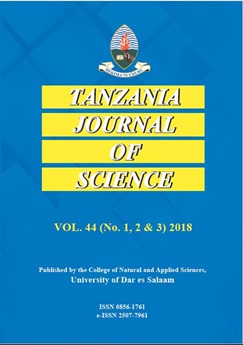Effects of Plant Species Diversity and Biomass on Grazing Patch Selection by Semi Free-Ranging Cattle
Abstract
Studies examining forage selection by large herbivores have generally focused on single herbivore-plant relationships and few studies link plant species diversity with large herbivore feeding preferences, particularly in species-rich ecosystems. A study was therefore conducted to examine how herbaceous plant biomass, species richness, diversity and evenness, together with elevation and distances to houses, agricultural fields and cattle holding-pen areas (kraals), predict cattle grazing intensity at small (0.5 x 0.5 m) and large (20 x 50 m) patches by semi free-ranging indigenous cattle in Kilombero Valley Floodplain wetland Tanzania. Results showed that cattle grazed patches with high species richness and intermediate level of biomass at a small spatial scale, suggesting that selection of small patches is a trade-off between food quality and quantity. On a larger scale, cattle grazed patches with a higher abundance of palatable plant species with high biomass, but with less plant species diversity. Moreover, grazing intensity in large patches was positively related to elevation and distance from agricultural fields. Overall, this study shows that considering both plant community properties and physiographic variables in forage selection studies facilitates a better understanding of grazing ecology of large domestic herbivores in species-rich ecosystems. Thus, maintenance of plant species richness and biomass in wetland rangelands is important to improve domestic herbivore production and conservation of biodiversity.
Keywords: Domestic herbivore; Forage selection; plant-animal interaction; Rangelands; Species richness.


